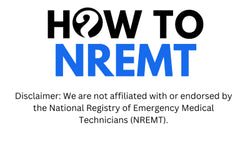Test anxiety is a common challenge among students preparing for high-stakes exams, and the NREMT (National Registry of Emergency Medical Technicians) exam is no exception. As a crucial step in becoming a certified paramedic, the NREMT exam requires focus, calmness, and confidence.
Yet, for many candidates, the pressure to succeed can lead to stress and nervousness, which can hinder performance. The good news is that there are effective strategies to overcome NREMT exam anxiety and approach the test with a clear and focused mind.
In this guide, we’ll walk through several proven techniques, including mindfulness practices, breathing exercises, and mental strategies, to help you stay calm and prepared on exam day.
Understanding NREMT Test Anxiety
Before we look at how to manage anxiety, it's important to understand what test anxiety is. Test anxiety is a form of performance anxiety that manifests as excessive worry and fear about upcoming exams. It can lead to physical symptoms like rapid heartbeat, sweating, and difficulty concentrating. For the NREMT exam, this anxiety can make it hard to recall vital information or feel confident about your abilities.
The good news is that test anxiety is completely normal and manageable. With the right strategies, you can overcome NREMT exam anxiety and approach the test with a positive mindset. Let's take a look at some of the most effective techniques.

1. Practice Deep Breathing and Relaxation Techniques
One of the easiest and most effective ways to manage anxiety is through deep breathing exercises. Deep breathing helps activate your body’s relaxation response, reducing the physical symptoms of anxiety like a racing heart or shallow breathing.
How to practice deep breathing:
- Sit comfortably in a quiet space.
- Close your eyes and focus on your breath.
- Breathe deeply through your nose for a count of four.
- Hold your breath for a count of four.
- Exhale slowly through your mouth for a count of six.
- Repeat this process for a few minutes, focusing on the sensation of your breath.
Breathing exercises can help you stay calm during your NREMT exam prep and reduce feelings of stress when you're in the middle of studying or even when you're in the test center.
2. Use Visualization to Build Confidence
Visualization is a powerful technique that can help you overcome NREMT exam anxiety by mentally preparing you for success. Visualization involves imagining yourself succeeding during the exam, from walking into the testing center to confidently answering questions. This practice can help you reframe your mindset and view the test as an opportunity rather than a source of stress.
How to practice visualization:
- Find a quiet space and close your eyes.
- Imagine yourself walking into the testing room, feeling calm and composed.
- Picture yourself answering questions with confidence, recalling all the knowledge you've gained through your NREMT exam prep.
- Visualize yourself completing the exam with ease and receiving your passing results.
- Repeat this process regularly to build confidence.
3. Stay Organized with a Study Schedule
A well-organized study schedule for NREMT test prep can alleviate feelings of being overwhelmed. When you break your preparation into manageable chunks, you’ll feel more in control and less anxious about covering all the material. A study schedule helps ensure that you give yourself enough time to review key concepts while also taking regular breaks.
How to create a study schedule:
- Identify your goals:What areas do you need to review most? Focus on high-priority subjects like trauma care, airway management, and pharmacology.
- Break study time into blocks:Use the Pomodoro technique—study for 25 minutes and take a 5-minute break. After four study blocks, take a longer break (15-30 minutes).
- Review weak areas:Dedicate more time to subjects that you find challenging.
- Incorporate practice exams:Simulate real exam conditions by taking timed practice tests to gauge your progress and reduce exam-day surprises.

4. Maintain Healthy Habits
Taking care of your body is just as important as preparing mentally for the NREMT exam. Proper nutrition, regular exercise, and adequate sleep all play a key role in managing anxiety. When you take care of your physical health, your mental resilience improves, making it easier to handle stress.
- Nutrition for exam success:Eat balanced meals that provide energy and focus, such as whole grains, lean proteins, fruits, and vegetables. Avoid excess caffeine or sugary snacks, which can spike your anxiety levels.
- Exercise:Physical activity is a natural stress reliever. Even a short daily walk can help clear your mind and improve focus during your NREMT exam prep.
- Sleep:Sleep is essential for memory consolidation and cognitive function. Aim for at least 7-8 hours of sleep each night, especially in the week leading up to the exam.
5. Stay Positive with Affirmations
Positive affirmations are a great way to combat self-doubt and anxiety. By repeating affirmations that emphasize your strengths and abilities, you can replace negative thoughts with positive beliefs. This practice helps you stay calm and confident as you approach the NREMT exam.
Examples of positive affirmations:
- "I am well-prepared for this exam."
- "I have the knowledge and skills to succeed."
- "I trust in my ability to answer each question."
- "I am calm, confident, and focused."
6. Take Breaks and Practice Self-Care
During your NREMT exam prep, it’s easy to get caught up in endless hours of studying. However, this can lead to burnout and increased anxiety. It’s important to balance your study time with self-care activities that help you recharge.
Ideas for self-care:
- Engage in a hobby that relaxes you, such as reading, painting, or listening to music.
- Practice yoga or meditationto calm your mind.
- Take breaks throughout the day to avoid mental fatigue.
- Incorporating rest into your schedule is just as important as studying.
7. Seek Support When Needed
Don’t hesitate to reach out for support if you’re feeling overwhelmed. Talking to friends, family, or a mentor can help you gain perspective and reassurance. Joining an NREMT study group or connecting with others preparing for the exam can provide a sense of community and reduce feelings of isolation.
If you’re struggling with severe anxiety, consider seeking help from a counselor or therapist. Professional support can provide additional strategies for managing stress and anxiety before the exam.

Calm, Collected, and Ready: Your Path to NREMT Success
By incorporating mindfulness techniques, staying organized, and maintaining healthy habits, you can overcome NREMT exam anxiety and approach your exam day with confidence. The key to success lies in finding what works best for you. The more you manage your anxiety, the more effectively you’ll be able to demonstrate your knowledge during the NREMT exam.
If you’re ready to start your NREMT exam prep with confidence, How to NREMT can help you every step of the way. From practice tests to personalized coaching, we offer tools and support to ensure you’re fully prepared.
Start Preparing with How to NREMT Today! Let’s get you on track for success.

